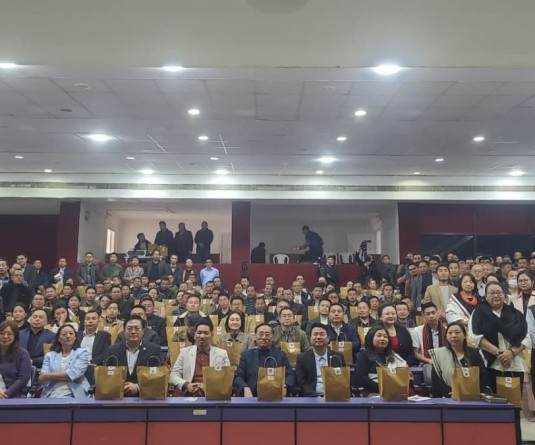
‘NTC accuses the Nagaland State Government of decimating the Commission to a mere ‘paper tiger’
Dimapur, June 18 (MExN): Accusing the State government of “decimating” the power of State Vigilance Commission (SVC) to a mere “paper tiger” without any legal authority, the Nagaland Tribes Council (NTC) today urged the government to restore its power within two weeks time.
In a representation to the Chief Secretary, Government of Nagaland, which was released to the media here through its President Lendinokdang Ao and Convenor, Committee on SVC, Theja Therieh, NTC flayed the State Government for decimating the lawful authority of Nagaland SVC by a resolution passed on June 8.
The June 8 resolution is found to be “detrimental” to the interest of the general public as there should “always be an authority acting as a deterrent to corrupt activities in the State,” NTC argued demanding urgent restoration of adequate powers and jurisdictions to the anti corruption bureau.
“The NTC expects the Government to rectify the anomalies committed in the resolution in question within two weeks time,” NTC stated adding that it will be will be compelled to take the issue to the next level if the government remains “insensitive to the demand tabled.”
Justifying its demand, the Council drew the Chief Secretary’s attention to the first formation of Nagaland SVC through a resolution passed on April 9, 1976 in line with the Union Home Ministry’s establishment of Centre Vigilance Commission on February 11, 1964 based on the recommendation of K. Santhanam Committee on Prevention of Corruption.
Subsequently, Nagaland Government through a notification on June 15, 1976 declared the Office of the Directorate of Vigilance as Police Station, it maintained adding that the Director of Vigilance was conferred the authority to be in-charge of the Police Station (Vigilance) through another resolution passed on December 9, 1976.
NTC also pointed out that through another notification on August 21, 1999 the State Government streamlined the power of inquiry and the jurisdiction of SVC with specific reference to Indian Penal Code Rules.
Again, the State government empowered the Tribunal for Disciplinary Proceedings in the SVC as per clause of the April 9, 1976 resolution as the Special Judge within its jurisdiction through on order passed on March 23, 2007, it added.
“By the aforementioned notifications, the legal status and the jurisdiction of the Nagaland State Vigilance Commission had been shaped and equipped with the legal Paraphernalia to act as watchdog and checkmate corruption in the State of Nagaland.”
NTC said the recent June 8 resolution was purportedly made to add more provision to the existing resolution, stating first that it was“to lay down the following additional provisions to the Resolution No. CON-58/75 dated, Kohima, April 9, 1976.” However, NTC alleged that a complete contradiction was presented as all previous resolutions, and notifications concerning SVC stood “modified” as per the same resolution.
While any private individual or group of private individuals can cause offense against the interest of the State, the June 8 Resolution also confined the jurisdiction of the SVC to just the employees of State Government and public corporations, statutory bodies and undertakings of the State, NTC maintained.
“The amended provision keeps the private individual or private firm immune from the purview of Vigilance Commission” defeating the very purpose the Commission was constituted, NTC stated.
It further questioned amended resolution which modified the power of inquiry of the Commission to the extent of removing the power of “suo-moto” provision.
Though not “specifically referred,” the Council thus alleged that the June 8 resolution has also “emasculated” the clauses 2 and 5 of the April 9, 1976 Resolutions which stated that the SVC “will not be subordinate to any department and will have the same measure of independence and autonomy as the State Public Service Commission.”
However, the Chief Secretary, Govt. of Nagaland, has the overriding authority over the Commission “arbitrarily” in the amended version, NTC said.
“Such dilution of the powers of the Commission will definitely hamper the efficiency of the investigative authority.” In this connection, NTC further observed that the June 8 Resolution has subjectively “divested the legal powers of the only investigative establishment in Nagaland for corruption.”
The Commission has now become a “showpiece,” it noted, adding that reducing it to a ‘tiger paper’ is as good as winding up as “there is no necessity to have such Commission without legal investigative powers.”
The NTC, therefore, urged upon the Government of Nagaland to restore the legal powers to the SVC by revoking the erroneous resolution without delay.






